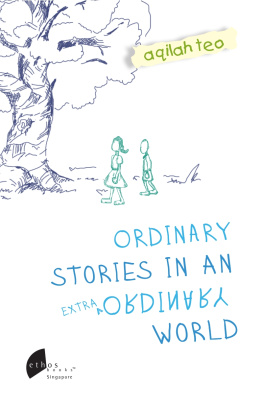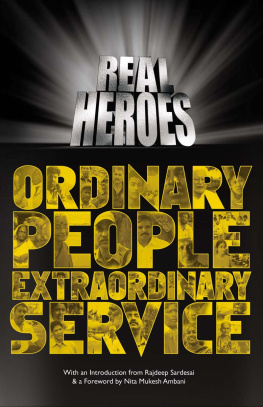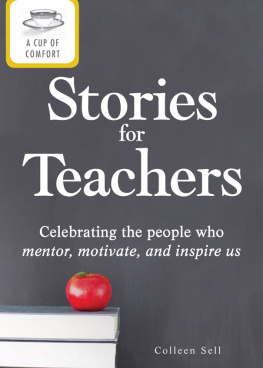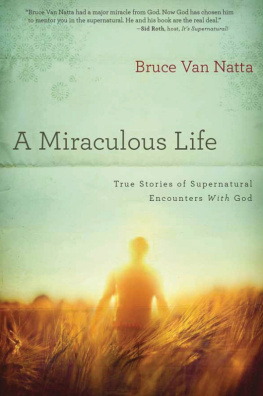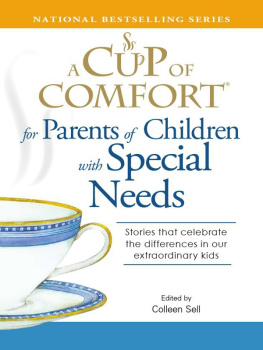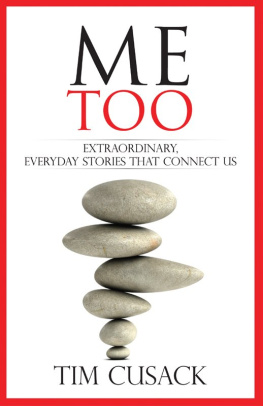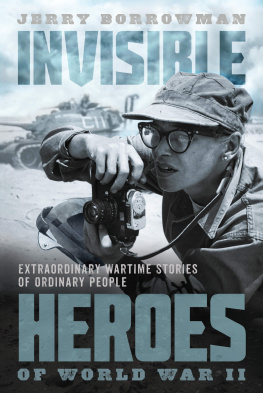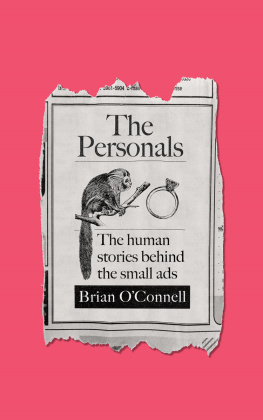An excellent account of the writers candid experiences with her autistic sibling as well as daily struggles her family has to cope with. Free of jargon, it is an easy read that provides an insight into the autism world, and allows readers to peer into the mind and understand the idiosyncratic behaviours of an autistic individual.
Dr Noel Chia Kok Hwee, Assistant Professor, Early Childhood & Special Education Academic Group, NIE
Just as with mental illness, there are many misconceptions about autism. This book, beautifully penned by the author that draws on the struggles of a family with an autistic child, brought tears to my eyes. And it leads me to ask: Cant society learn to accept that children with autism are also Gods children who need love, understanding and support to enable them to lead perfectly normal lives?
Raymond Anthony Fernando, Author, Motivational Speaker, Mental Health Activist
Aqilah Teo, 2012
ISBN 978-981-07-1800-8 (paperback)
ISBN 978-981-14-0894-6 (ebook)
Published under the imprint Ethos Books by
Pagesetters Services Pte Ltd
65 Ubi Crescent
#06-04 Hola Centre
Singapore 408559
www.ethosbooks.com.sg
With the support of
All rights reserved. Except for the quotation of short passages for the purpose of criticism and review, no part of this publication may be reproduced, stored in a retrieval system, or transmitted, in any form or by any means, electronic, mechanical, photocopying, recording or otherwise, without the prior written permission of the publisher.
Cover design by Merlin Sudianto
Produced by Pagesetters Services Pte Ltd
Printed and bound in Singapore
National Library Board, Singapore Cataloguing-in-Publication Data
Teo, Aqilah,1985
Ordinary stories in an extraordinary world /Aqilah Teo. Singapore : Ethos Books, c2012.
p. cm.
ISBN : 978-981-07-1800-8 (pbk.)
ISBN : 978-981-14-0894-6 (ebk)
1. Autistic children Singapore Biography. 2. Autistic children Care
Singapore. I. Title.
RJ506.A9
618.92858820092 -- dc22
OCN780421871
This e-book is licensed for your personal enjoyment only. If you would like to share this book with another person, please purchase an additional copy for each person you share it with.
If youre reading this book and did not purchase it, or it was not purchased for your use only, please consider getting your own copy from ethosbooks.com.sg. Thank you for respecting the hard work of this author.
To my father Paul Teo, the scholar
To my mother Sabariah Teo, the sage
And to Jan, who sits beside me as I write.
About the Author
Aqilah Teo is a preschool teacher and freelance writer who has worked with children ranging from preschoolers to teenagers. Her brother's autism led to her fascination with psychology and epistemology. She hopes to shine a spotlight on the special needs world through the stories in this book.
Prologue
As I have mentioned to many friends, this is not a textbook on autism. That would be a very interesting textbook, and it has not been written yet. Perhaps it will never be. Nor is this a manual on special needs; no, nothing of that sort.
This is a true account of what the special needs world is like in Singapore. Here, I have covered merely a fraction of the thousands of stories that can be told in a thousand different ways.
I am only able to write from a second-hand point of view on autism. A first-hand account mapping out all the secrets of autism would probably be declared the next Wonder of the World. But Jan has so far not shown any inclination for writing.
One may jest, but in the special needs world, we are constantly fighting for awareness and provisions. Sometimes, it is simply about acceptance, one less sneer at, and one more open heart for a special needs child on the street. This is my part of the fight.
All the names mentioned in this book are real, except for those of children and my brother himself. Jan is not his real name. It does, however, hold a special significance for him.
Aqilah Teo
The 1st Step: Into the Dangerous World
My brother Jan had not come with a manual.
My memories of the events surrounding his birth are somewhat fuzzy today, but I recall my parents had not said to me, Congratulations, youve a new baby brother. Weve got a manual too, so well figure out how to operate him soon enough.
I had lived as an only child for the first six years of my life, and did not fully understand the concept of a baby brother.
My parents seemed to be very busy and I knew that something important was going to happen. I knew what babies looked like, and someone had probably told me that we would have one in the house soon.
What is this new thing that is coming? I had wondered. Is it for me? Does it run on batteries? Will it make a noise if I poke at it?
Beyond that, however, it was all vague bits of uninteresting information as I went about my own daily business.
Then, one day, the new arrival came home. I resented the intrusion of this new member of the family, this reddish wailing thing wrapped in a large white napkin. I might have preferred a hotdog; it would have looked almost the same and posed a much lesser threat.
Nonetheless I soon grew fond of him in a shallow, childish way. He was cute, and fun to poke at and play with. But when it came to important matters such as who got to lie next to my mother at bedtime, I turned into a monster of a jealous sibling. Indeed, I would push him away and throw great tantrums until my mother handed him over to the domestic help to rock him to sleep.
Jan soon grew to be a round, healthy, happy toddler and no one suspected anything different. He first sat up at six months. His first words were mam mam and meow at around the same time. He stopped saying anything else after that.
At one year and two months, Jan took his first steps. When he was two and a half years old, still not another word had come out of his mouth. The grown-ups suspected he was either a slow developer, or had tongue tie. Tongue tie happens when the membrane under the tongue is unusually short. It pulls at the tongue, which then cannot move as freely. People with tongue tie have trouble speaking.
Little Jan was brought to see the general practitioner. The doctor said Jans tongue was perfectly fine. It could be autism.
At the time, my mother had no idea what autism was or what the word meant, but she knew something was not right. She excused herself from the doctors office, went outside and began to weep. Now this really was something, because my mother is not a weepy sort of person.
My parents called doctors, and they called other doctors. My brother was carted all over the place like a wrongly-addressed parcel.
One Dr K B Phua, a gifted and respected paediatrician, arranged for speech therapy sessions for my brother. The therapists said that Jan was ego-centric, but they were not able to properly categorise him as autistic. In fact, he did not seem to really fit in any profile at all.
When Jan was three, the speech therapists contacted Balestier Special School. They arranged for assessments and ran him through a gauntlet of tests with cameras and videos and machinery. Jan was also brought to see Dr Vera Bernard-Opitz at the National University of Singapore. But he simply did not fit into any of their programmes. They kindly advised us to bring him home. Knowing my brothers bossiness, he might have been trying to run a few programmes of his own over there.

